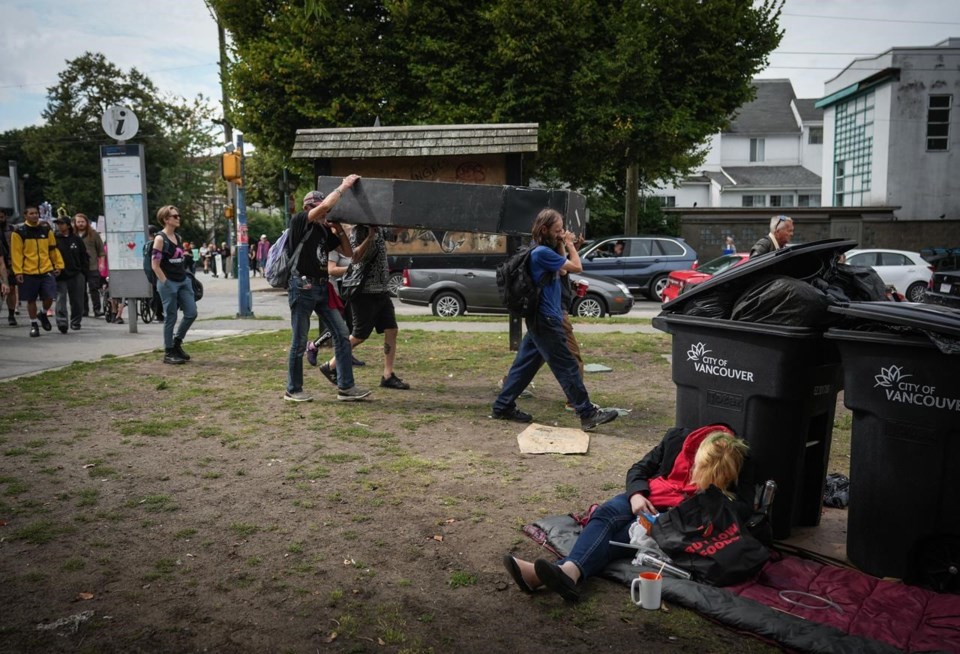VICTORIA — A call to provide controlled drugs without prescriptions to people in British Columbia in an effort to battle the deadly overdose crisis that has killed thousands of people was promptly rejected Wednesday by the provincial government.
Chief Coroner Lisa Lapointe said she was "disappointed" in the government's immediate dismissal of a death review panel's controversial recommendations to increase safer supply initiatives, because the alternative is watching deaths continue.
"If we don't take their best advice then the onus is on us as a province to sadly watch the death toll continue," she said at a news conference. "In the BC Coroners Service our position is we do what we can to reduce death, period. We are always looking for measures to prevent deaths."
Jennifer Whiteside, B.C.'s minister of mental health and addictions, turned down the non-prescription recommendation in a letter to Lapointe distributed to the media just before the coroner's news conference.
Non-prescription models for the delivery of pharmaceutical alternatives are not under consideration, her letter said.
"Accordingly, I cannot accept the primary recommendation of this report to pursue a non-prescriber model of safer supply," said Whiteside's letter.
The death review panel report said about 225,000 people in B.C. use unregulated substances but fewer than 5,000 people a month have prescriptions to receive safe-supply drugs.
More than 13,000 people have died since April 2016, when the province declared a public health emergency for the overdose crisis as the powerful opioid fentanyl became more common on the streets.
The panel's report came out on the same day as the monthly overdose death toll was released, saying 175 people in September died from illicit drug overdoses, a 10 per cent drop from the same month a year ago, but still equal to 5.8 deaths a day across B.C.
The report said there's an urgent need for a practical, scalable response to the crisis and the key recommendation would be more nimble to meet the unique needs of people in communities that are rural and remote, or that lack the infrastructure needed by medical clinics.
"A fundamentally different approach is urgently required as incremental increases of existing interventions are unlikely to make a meaningful population difference and people will continue to die at unprecedented rates," the report said.
Lapointe said the review and its recommendations are based on evidence provided by addiction experts, researchers and people who have lived experience in the overdose crisis.
"These are hard questions. This is their advice. I stand by their advice." she said.
Lapointe acknowledged the issue of safer supply and drug decriminalization has been the topic of debate among politicians and communities, but she's weighing in on the side of evidence.
"That's what the panel's recommended here," she said. "Let's look at the evidence. Let's look at the research. It's sometimes easy to listen to the loudest voice in the room, but the loudest voice isn't always the right voice."
It's difficult not to look for more options to battle the crisis when people are dying day after day, Lapointe said.
"If you see somebody in a burning house, you feel somewhat justified to smash a window," she said. "This crisis is massive. Two hundred and twenty five thousand people are at risk of dying every day."
Michael Egilson, chair of the death review panel, said the report's recommendations reflect the sense of urgency in the province to prevent more overdose deaths.
"The first recommendation is to the Ministry of Mental Health and Addictions to apply to the federal government for an exemption to the Controlled Drugs and Substances Act to allow access to opioid and stimulant drugs without a prescription," he said.
Egilson said panel members had a lot of discussion about concerns that the non-prescription drugs could be diverted for sale on the streets.
"The consensus of the panel is that with a proper system of checks and balances in place, the substances can be provided in a safe and responsible manner."
He said a "robust" monitoring and evaluation program would have to be established with adjustments made as required.
"We cannot become numb to the devastating numbers," said Egilson. "This cannot become the new normal."
The panel's report was released just days after Vancouver police served search warrants on two homes and the Downtown Eastside office of the Drug Users Liberation Front, or DULF, over allegations of drug trafficking.
The group's website said its "fulfilment centre" allowed drug users to receive up to 14 grams of cocaine, heroin or methamphetamine per week, with the substances tested for safety before sale in what is a very similar service suggested by the death panel review as a solution.
The "compassion club" had been funded by the government, but Solicitor General Mike Farnworth told the legislature this week that funding was cut off when officials found out the group was doing more than testing illicit drugs.
Lapointe said organizations like DULF are committed to reducing the harms they see on a daily basis.
"And I think it's hard to appreciate the level of trauma in communities and front-line service providers, when they see real people dying in front of them day after day after day. I can speak for my own organization, it is traumatizing."
Health Canada granted B.C. an exemption under the Controlled Drugs Act last January to allow people in B.C. to possess small amounts of hard drugs in an effort to reduce the stigma associated with drug use and prevent deaths.
This report by The Canadian Press was first published Nov. 1, 2023.
Dirk Meissner, The Canadian Press
Note to readers: This is a corrected story. A previous version said almost 14,000 people had died from overdoses since April 2016.


